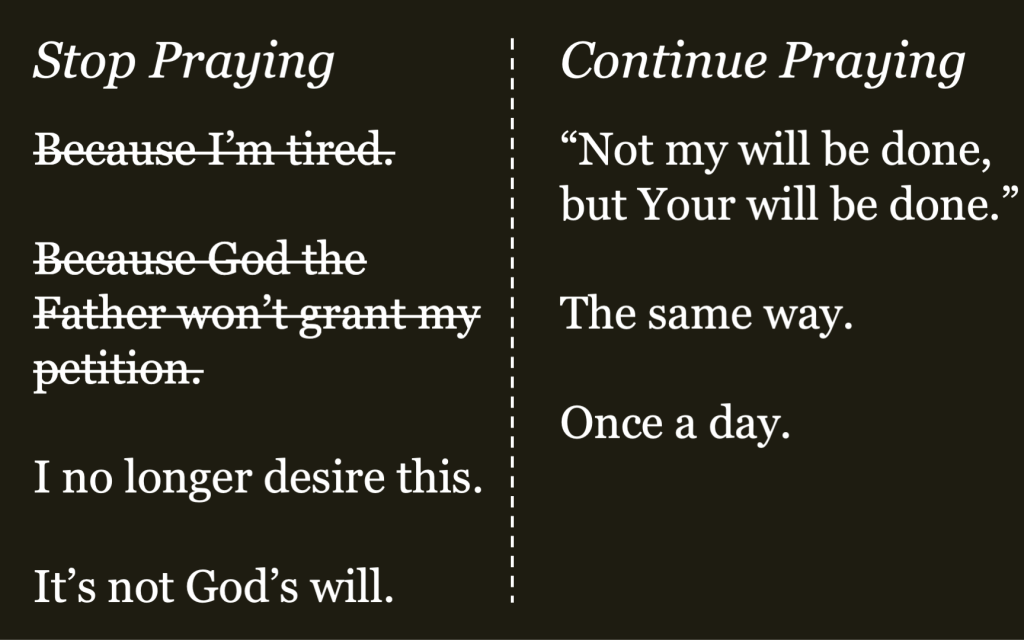About six or seven years ago, I was praying that St. Anthony’s would be able to hire some great missionaries who could help us grow, but we weren’t able to hire anyone. At one point, I got into a bit of a panic: “We can’t find anyone good!” I was also personally embarrassed, because I’m proud, and no one wanted to work with me in the Lord’s vineyard. This is like a professional failure, if you’ve ever experienced that. Because of all this, my prayer for these hires started to wane: At the beginning, I was asking God with fasting and sacrifices, but after a year or two, not so much. This is my worst experience of giving up on prayer. What’s yours? When have you prayed and nothing happened, and then gave up? (It’s terrible, isn’t it, to give up on Jesus?)
Let’s meditate on our Lord’s words: “Jesus told the disciples a parable about their need to pray always and not to lose heart” (Lk 18:1). The logic of the parable is simple: If an evil judge grants the request of someone who doesn’t give up, how much more will God, Who is our Father, give us what we need, when we ask Him constantly.
Jesus ends with three questions: “Will not God grant justice to his chosen ones who cry to him day and night? Will he delay long in helping them? And yet, when the Son of Man comes, will he find faith on earth?” (Lk 18:7-8). When Jesus asks about finding ‘faith,’ He’s asking: Will He find that, even after a difficult life, we’ll still acknowledge that He’s our Father? Will all of us say, at the end of our lives, that He was a good Father?
Let’s go deeper. Jesus says God the Father will grant ‘justice,’ which, according to one Scripture scholar, means ‘vindication’ (Arthur A. Just, ed. Luke in Ancient Christian Commentary on Scripture, 276), in the original sense of the word, when God sets us free, defends, and justifies us. So, after a struggle, God will grant us what we need, not necessarily that for what we ask. He never said St. Anthony’s has a right to be given the best staff. The fact that we, at present, have an amazing staff of 11 is a gift, but we were never entitled to it. Now, we may object, ‘But, why doesn’t He give us the good things we ask for?’ What if He wants us all to grow first before we receive His gifts?
When God didn’t give us any new staff, I took it as a message that I had to get better. A priest once asked me, “We’re trying to hire a youth minister, but no one’s applying.” So, I said to him, “Maybe no one wants to work for you.” It sounds harsh, but that’s what I said to myself! I don’t know what you’re praying for, but maybe God wants you to mature first.
When Jesus was in the garden, He prayed, “My Father, if it be possible, let this cup pass from me; nevertheless, not as I will, but as you will” (Mt 26:39). St. Matthew specifies that Jesus prayed the same thing a “second time,” and a “third time” (26:42,44), because He didn’t give up. The question for us is: Did God the Father vindicate Jesus? Our answer will determine whether we give up on prayer, or continue. If our answer is, ‘Yes, the Father vindicated Jesus because He’s a good Father,’ then our horizon of what is good expands: God the Father didn’t want to save His Son from torture and death, but did something infinitely better: He showed us that He loves us to the point of giving up His Son, that He would forgive our sins, and that He’s offering us eternal life.
In 1994, when the Rwandan genocide of hundreds of thousands of people began, Immaculée Ilibagiza and seven other women hid in a bathroom four by three feet. Here she is, years later, revisiting the hiding place:
Inside, the women would take turns crouching and standing for 91 days, while Hutu killers would ransack the house repeatedly looking for targets.
In spite of her intense daily prayers for protection, a former teacher, former family friends and neighbours turned on Immaculée and her family, which led to the murders of her father, mother, and brother, and the literal hacking-to-pieces of another brother. Did God the Father vindicate her?
After she and the other ladies escaped, two of the greatest miracles are when she had a dream of her brother, and when she forgave the murderers. She wrote, “I couldn’t shake the crippling sorrow that seized my heart whenever I envisioned how [my family] had been killed. Every night I prayed to be released from my private agony, from the nightmares that haunted my sleep and troubled my days. It took a while, but as always, God answered my prayers” (Left to Tell, 201). In the dream, her brother said to her, “You’ve been gloomy far too long and must stop all this crying. Look at the wonderful place we’re in… can you see how happy we are? If you continue to believe that we’re suffering, you’ll force us to return to the pain we’ve left behind… You must love, and you must forgive those who have trespassed against us.”
The second and greater miracle was that she was one of the few survivors who forgave. To make a broad generalization, a huge number of Hutus had hated the Tutsis, and after the war, many Tutsis started to hate them in return. And the cycle of hatred would continue, but not for Immaculée.
When she went to a prison to meet the man who murdered her mother and brother, the prison guard literally threw the man in while shouting at him, but, after a short while, the only thing Immaculée said to the murderer was, “I forgive you.” After sending the man away, the guard said, “What was that all about, Immaculée? That was the man who murdered your family. I brought him to you to question… to spit on if you wanted to. But you forgave him! How could you do that?” That guard wasn’t able to forgive, but the miracle is that Immaculée was.
So, what is a greater miracle: preventing people from suffering, or survivors forgiving their assailants? I don’t want anyone to suffer at the hands of another, but that’s the consequence of free will.
Immaculée writes, “God… spared my life for a reason: He left me to tell my story to others and show as many people as possible the healing power of His love and forgiveness” (208-209).
So, this requires a response on our part. Jesus specifies that justice, that is, vindication, comes ‘to his chosen ones who cry to him day and night.’ Don’t give up, because the Father is good. Practically speaking, how do we know when to continue or stop praying for something? Here’s a chart:
Stop praying
“Because I’m tired.” This isn’t a good reason to stop praying.
Nor is, ‘I stopped praying: “Because God the Father won’t grant my petition.”
However, if we realize “I no longer desire this” then that’s a good reason.
Same if we realize that “It’s not God’s will.” He doesn’t want me to ask for this anymore.
Continue praying
First, always add, “Not my will be done, but Your will be done” to make sure we’re open to the reality that the Father might want to vindicate us some other way.
Then, we can either pray, “The same way” with the same frequency and duration.
Or, we can pray “Once a day” with all our heart, and then, later during the day, when we start worrying about it, just say, “Lord, I already gave it to You. It’s in Your hands. I’ll return to it tomorrow. But, because You’re the best Father, I won’t worry about it for the rest of the day.”
Jesus asked, ‘When the Son of Man comes, will he find faith on earth?’ After all she had been through, Immaculée, at the end of her book, still wrote, “First, I must thank God above all others for being a wonderful father and best friend, my truest confidant… and my savior. You have been my constant companion in the best of times and the very, very worst of times. Thank You, God, for opening my heart and letting me love again. I am nothing without You, and I am everything with You. I surrender to You, Lord—let Your will be done in my life” (211). If we don’t give up, God vindicates us.



